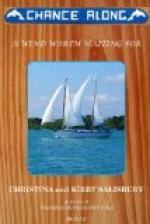Winter was at the heels of the Courteau party when it arrived at this point in its journey; it brought up the very tail of the autumn rush and the ice was close behind. The Countess and her companions had the uncomfortable feeling that they were inside the jaws of a trap which might be sprung at any moment, for already the hills were dusted with gray and white, creeks and rivulets were steadily dwindling and shelf ice was forming on the larger streams, the skies were low and overcast and there was a vicious tingle to the air. Delays had slowed them up, as, for instance, at Windy Arm, where a gale had held them in camp for several days; then, too, their boats were built of poorly seasoned lumber and in consequence were in need of frequent attention. Eventually, however, they came within hearing of a faint whisper, as of wind among pine branches, then of a muffled murmur that grew to a sullen diapason. The current quickened beneath them, the river-banks closed in, and finally beetling cliffs arose, between which was a cleft that swallowed the stream.
Just above the opening was a landing-place where boats lay gunwale to gunwale, and here the Courteau skiffs were grounded. A number of weather-beaten tents were stretched among the trees. Most of them were the homes of pilots, but others were occupied by voyagers who preferred to chance a winter’s delay as the price of portaging their goods around rather than risk their all upon one throw of fortune. The great majority of the arrivals, however, were restowing their outfits, lashing them down and covering them preparatory to a dash through the shouting chasm. There was an atmosphere of excitement and apprehension about the place; every face was strained and expectant; fear lurked in many an eye.
On a tree near the landing were two placards. One bore a finger pointing up the steep trail to the top of the ridge, and it was marked:
“This way—two weeks.”
The other pointed down directly into the throat of the roaring gorge. It read:
“This way—two minutes.”
Pierce Phillips smiled as he perused these signs; then he turned up the trail, for in his soul was a consuming curiosity to see the place of which he had heard so much.
Near the top of the slope he met a familiar figure coming down—a tall, upstanding French-Canadian who gazed out at the world through friendly eyes.
’Poleon Doret recognized the new-comer and burst into a boisterous greeting.
“Wal, wal!” he cried. “You ‘ain’t live’ to be hung yet, eh? Now you come lookin’ for me, I bet.”
“Yes. You’re the very man I want to see.”
“Good! I tak’ you t’rough.”
Phillips smiled frankly. “I’m not sure I want to go through. I’m in charge of a big outfit and I’m looking for a pilot and a professional crew. I’m a perfect dub at this sort of thing.”
’Poleon nodded. “Dere’s no use risk it if you ’ain’t got to, dat’s fac’. I don’ lost no boats yet, but—sometam’s I bus’ ’em up pretty bad.” He grinned cheerily. “Dese new-comer get scare’ easy an’ forget to row, den dey say ’Poleon she’s bum pilot. You seen de canon yet?” When Pierce shook his head the speaker turned back and led the way out to the rim.




